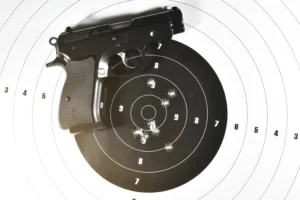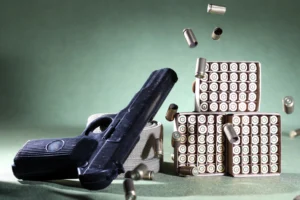Target practice is a fundamental aspect of responsible firearm ownership. It involves engaging in deliberate and focused shooting exercises to improve shooting skills, enhance safety awareness, and build confidence. Whether you are a novice shooter or an experienced firearm enthusiast, regular target practice is essential for several reasons. In this article, we will explore the importance of target practice with your firearm and the benefits it offers.
Skill Development and Accuracy:
One of the primary reasons for engaging in target practice is to develop and improve shooting skills. Target practice allows shooters to refine their aim, focus, and control over the firearm. By consistently practicing, shooters can enhance their accuracy and precision, regardless of the shooting discipline they pursue, such as self-defense, competitive shooting, or hunting.
Through repetitive shooting exercises, shooters learn to align their sights, control their trigger pull, and develop muscle memory. These skills translate into improved shooting proficiency, enabling shooters to hit their intended targets more consistently and effectively. Whether it’s hitting a bullseye on a paper target or making precise shots in a dynamic shooting scenario, target practice plays a crucial role in honing shooting skills.

Regular target practice keeps your skills sharp
Safety and Firearm Handling:
Another vital aspect of target practice is the promotion of firearm safety and responsible handling. Regular practice sessions provide an opportunity for shooters to reinforce and internalize safety protocols and procedures. Safety practices, such as always treating a firearm as if it’s loaded, keeping the finger off the trigger until ready to shoot, and maintaining muzzle awareness, become ingrained through repeated practice.
Moreover, target practice allows shooters to familiarize themselves with their specific firearms. It enables them to develop a deep understanding of their firearm’s operation, including its controls, functions, and potential limitations. By becoming intimately familiar with their firearms, shooters can mitigate the risks associated with accidental discharges or malfunctions.
Confidence Building:
Target practice also plays a crucial role in building confidence. As shooters witness their progress and improvements, their confidence in their shooting abilities grows. This increased confidence positively impacts overall performance and mindset, leading to better decision-making in high-pressure situations.
The confidence gained through target practice extends beyond the shooting range. It carries over to real-life scenarios where shooters may need to employ their firearms for self-defense. By having confidence in their shooting skills and understanding the capabilities of their firearms, shooters can better handle stressful situations, making more accurate and effective decisions.
Stress Management and Mental Focus:
Target practice offers an opportunity for shooters to develop mental focus and learn how to manage stress. Shooting exercises require concentration, discipline, and the ability to block out distractions. By engaging in target practice, shooters can enhance their mental acuity and develop the capacity to remain calm and composed during shooting sessions.
As shooters progress and challenge themselves with different shooting drills and scenarios, they learn to adapt, make quick decisions, and maintain their focus under pressure. This mental fortitude developed through target practice can have broader applications in various areas of life, improving problem-solving skills, and promoting mental resilience.
Scenario Replication and Preparedness:
Target practice allows shooters to replicate real-life scenarios and train for specific situations. By setting up different target configurations, incorporating movement, or practicing shooting from various positions, shooters can simulate realistic scenarios they may encounter. This type of training enhances shooters’ ability to react quickly and effectively in self-defense or competitive shooting situations.
Additionally, target practice provides an opportunity to practice shooting skills with different firearms and calibers. This versatility ensures shooters are prepared and comfortable when handling a variety of firearms, allowing them to adapt to different shooting contexts and environments.
Self-Assessment and Improvement:
Target practice serves as a valuable tool for self-assessment and improvement. By carefully observing their shooting performance, shooters can identify areas that need improvement and focus their efforts on specific skills or techniques. Analyzing shot placement, groupings, and consistency helps shooters identify weaknesses and work towards addressing them.
Furthermore, target practice enables shooters to experiment with different shooting drills and techniques. They can explore various shooting positions, practice shooting on the move, or engage in timed exercises to improve speed and efficiency. By challenging themselves with new drills and techniques, shooters can push their boundaries and expand their skill set.
Regular target practice also facilitates the tracking of progress over time. Shooters can keep records of their shooting sessions, noting improvements, setbacks, and areas of focus. This documentation allows shooters to monitor their growth and provides a sense of accomplishment as they see their skills evolve.
Building Responsible Firearm Culture:
Engaging in regular target practice contributes to the promotion of a responsible firearm culture. By prioritizing practice and skill development, firearm owners demonstrate their commitment to safety, proficiency, and responsible firearm ownership. This dedication to honing shooting skills sets a positive example for others within the firearm community and encourages responsible behavior.
Moreover, target practice provides an opportunity for shooters to engage with and learn from other like-minded individuals. Participating in shooting clubs, competitions, or training courses allows shooters to exchange knowledge, share experiences, and benefit from the collective wisdom of the firearm community. This interaction fosters a culture of responsible firearm ownership, where safety, skill development, and continuous learning are valued.





